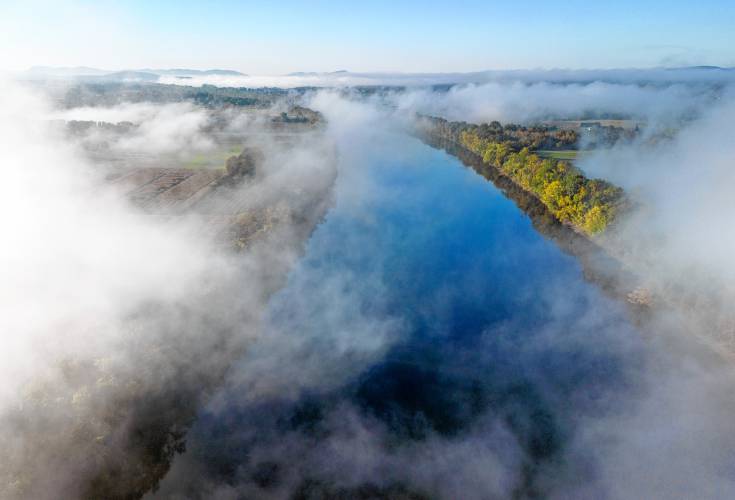Latest News
 Montague Police Logs: April 23 to April 28, 2024
Montague Police Logs: April 23 to April 28, 2024
 North Quabbin Food-A-Thon marks 20th year
North Quabbin Food-A-Thon marks 20th year

‘An environmental endeavor’: Bee Fest returns to Greenfield for 14th year on Saturday
GREENFIELD — Downtown Greenfield will be buzzing with activities on Saturday as Bee Fest returns for its 14th year. The roughly three-hour festival honors the Rev. Lorenzo Langstroth, the sixth minister of Second Congregational Church who is known as...

The cool new ‘underground’ spot in town: Le Peacock in Shelburne Falls delivers on colorful décor, people, food and cocktails
For weeks, friends have been telling me how much they love Le Peacock in Shelburne Falls. I finally got there on a recent afternoon … and the place lived up to the hype.Le Peacock is located beneath 10 Bridge Street in Shelburne Falls. The restaurant...
Most Read
 My Turn: Quabbin region will never see any benefits from reservoir
My Turn: Quabbin region will never see any benefits from reservoir
 Renovation of vacant Greenfield house will help those ‘priced out’ of home ownership
Renovation of vacant Greenfield house will help those ‘priced out’ of home ownership
 As I See It: Between Israel and Palestine: Which side should we be on, and why?
As I See It: Between Israel and Palestine: Which side should we be on, and why?
 Attorney seeks dismissal of RI man’s DUI charges in Northfield crash that injured seven
Attorney seeks dismissal of RI man’s DUI charges in Northfield crash that injured seven
 New USDA offices in Greenfield to aid staffing increase, program expansion
New USDA offices in Greenfield to aid staffing increase, program expansion
 Heath voters OK $1.6M town budget, school spending
Heath voters OK $1.6M town budget, school spending
Editors Picks
 On Mother’s Day, we’ll always have Paris: A crêpe recipe in honor of my French-speaking mother
On Mother’s Day, we’ll always have Paris: A crêpe recipe in honor of my French-speaking mother
 Greenfield Notebook: May 14, 2024
Greenfield Notebook: May 14, 2024
 South County Notebook: May 11, 2024
South County Notebook: May 11, 2024
 North County Notebook: May 14, 2024
North County Notebook: May 14, 2024
Sports

High Schools: Frontier boys, girls track finish season unbeaten in Intercounty League
Both the Frontier boys and girls track and field teams closed out the regular season with unblemished records to take home Intercounty League titles. The Redhawks traveled to Greenfield on Monday, with the Frontier boys picking up an 85-60 triumph...
Opinion

My Turn: Laurels and the laureate
This column is about my daughter Jo, her daughters Kobin and Ramona, a horse named Lady and U.S. Poet Laureate Ada Limón. And it also isn’t.Kobin is 5, almost 6. Ramona is 3, close to 4. Jo, the girls and their dad, Jo’s husband Dean, live in...
 My Turn: Choosing wisely for ourselves, next generation
My Turn: Choosing wisely for ourselves, next generation
 Bruce Kahn: Principle vs. pragmatism
Bruce Kahn: Principle vs. pragmatism
 Karl Meyer: A fool’s errand
Karl Meyer: A fool’s errand

Business

Retired police officer, veteran opens firearms training academy in Millers Falls
MILLERS FALLS — The Western Massachusetts Training & Education Academy offers an array of firearm courses taught by certified instructor and U.S. Marine veteran Leon “Lee” Laster. But you won’t find live ammunition on site.That’s because the new...
 New buyer of Bernardston’s Windmill Motel looks to resell it, attorney says
New buyer of Bernardston’s Windmill Motel looks to resell it, attorney says
Arts & Life

Get Growing with Mickey Rathbun: Venture beyond your garden walls: Plant sales and noteworthy gardens to visit this season
After long weeks of yearning for gardening weather, we’re suddenly inundated by spring. Endless outdoor chores beg for our attention — composting, mulching, edging, scrubbing birdbaths and, at least in my garden beds, pulling out multitudes of maple...
Obituaries
 Rachel A. Masson
Rachel A. Masson
Greenfield, MA - Rachel Armstrong Masson passed away from unforeseen natural causes at her home in Greenfield, Massachusetts, on May 7, 2024. She was 46 years old. Rachel will be remembered as a devoted wife and loving mother, sister an... remainder of obit for Rachel A. Masson
 Marvin Roger Herzig
Marvin Roger Herzig
Winchester, NH - A huge heart now lies still in a man nobody will ever forget. On April 28, 2024, Marvin Roger Herzig, 62, of Winchester, NH quietly passed away with his wife holding his hand. He was predeceased by his parents, Roge... remainder of obit for Marvin Roger Herzig
 Cecile A. Chartier
Cecile A. Chartier
Montague, MA - Cecile Anna (Ouellet) Chartier, 95 years old, of Turnpike Rd. passed away Wednesday April 24, 2024 at Charlene Manor Extended Care Facility. She was born in La Poca Tier, Quebec, Canada November 22, 1928, the daughter of ... remainder of obit for Cecile A. Chartier
 Joan Vander Vliet
Joan Vander Vliet
Bedford, MA - On Tuesday, April 9, 2024, Joan Clausen Vander Vliet, of Carleton Willard Village in Bedford, MA, went home to God surrounded by her loving family. Born in New Rochelle, NY on November 15, 1929, she was the daughter of ... remainder of obit for Joan Vander Vliet

 Great Strides Walk for Cystic Fibrosis marks 25th year in Shelburne Falls
Great Strides Walk for Cystic Fibrosis marks 25th year in Shelburne Falls
 Greenfield Middle School Honor Roll, Third Quarter
Greenfield Middle School Honor Roll, Third Quarter
 Hawley residents vote down resolution on state flag, seal for second year
Hawley residents vote down resolution on state flag, seal for second year
 Extreme weather forces Pioneer Valley farmers to adapt
Extreme weather forces Pioneer Valley farmers to adapt
 Frontier Regional School Honor Roll, Third Quarter
Frontier Regional School Honor Roll, Third Quarter
 Softball roundup: Hannah Gilbert, Franklin Tech hold off Frontier for 15th win
Softball roundup: Hannah Gilbert, Franklin Tech hold off Frontier for 15th win Softball: Turners Falls held off the board in 7-0 loss to Hampshire Regional (PHOTOS)
Softball: Turners Falls held off the board in 7-0 loss to Hampshire Regional (PHOTOS) High Schools: Greenfield softball beats Westfield, 3-2, in eight-inning showdown
High Schools: Greenfield softball beats Westfield, 3-2, in eight-inning showdown Four Rivers boys knock off Xaverian to win Four Rivers Ultimate Tournament on Saturday (PHOTOS)
Four Rivers boys knock off Xaverian to win Four Rivers Ultimate Tournament on Saturday (PHOTOS) Guest columnist Daniel Cantor Yalowitz: Being accountable a marker for maturity
Guest columnist Daniel Cantor Yalowitz: Being accountable a marker for maturity Fogbuster Coffee Works, formerly Pierce Brothers, celebrating 30 years in business
Fogbuster Coffee Works, formerly Pierce Brothers, celebrating 30 years in business Goddard finds ‘best location’ in Shelburne Falls with new Watermark Gallery space
Goddard finds ‘best location’ in Shelburne Falls with new Watermark Gallery space New Realtor Association CEO looks to work collaboratively to maximize housing options
New Realtor Association CEO looks to work collaboratively to maximize housing options Speaking of Nature: Surprised by strawberries in the grass: Flowers will bloom whether you pay attention or not
Speaking of Nature: Surprised by strawberries in the grass: Flowers will bloom whether you pay attention or not From fair to fantastic: Memorial Hall Museum exhibit shows how Green River Festival blossomed over 37 years
From fair to fantastic: Memorial Hall Museum exhibit shows how Green River Festival blossomed over 37 years Valley Bounty: Fibers for farmers: Western Massachusetts Fibershed turns local ‘throw away’ wool into fertilizer pellets
Valley Bounty: Fibers for farmers: Western Massachusetts Fibershed turns local ‘throw away’ wool into fertilizer pellets Sounds Local: Joni Mitchell tribute comes to Turners Falls: Big Yellow Taxi to perform ‘Court and Spark’ in its entirety, May 18 at the Shea
Sounds Local: Joni Mitchell tribute comes to Turners Falls: Big Yellow Taxi to perform ‘Court and Spark’ in its entirety, May 18 at the Shea
